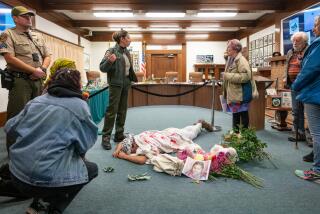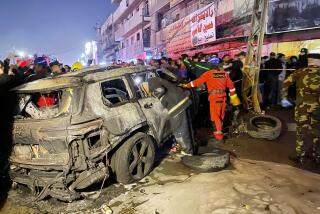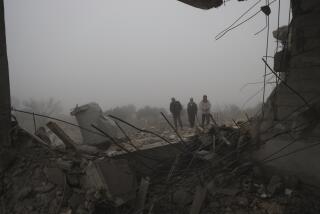Signs of life in Sadr City
An unfamiliar sound echoed Saturday on the streets of Sadr City, where gunshots and bomb blasts had rung out for weeks: cars honking their horns.
Traffic clogged the Baghdad district’s Mudafer Square, which in recent days had been devoid of life except for Iraqi and American Humvees, rooftop snipers and a giant mural of Shiite cleric Muqtada Sadr’s late father staring down from a burned-out building. A squat veiled woman balanced a sagging valise on her head, metal workers cut new billboards, and beggars sat in the middle of the pavement. A teenager in a plastic yellow apron sold glasses of root beer to the crowd.
The night before, 13 people had died in fighting between the U.S. military and Sadr’s Mahdi Army militia, the military reported. The Iraqi army had warned that bombs were buried in the streets, and fighters vowed to battle to the death.
But people had been cooped up in their homes for days and needed to get out. Although barbed wire and gun towers sealed off most entries to the district, the U.S. military opened a few roads to vehicles Saturday for the first time since late March.
Signs of the recent fighting were everywhere. Rusty yellow Iraqi tanks had rolled up Fallah Street, one of Sadr City’s main avenues, in an unprecedented foray. The soldiers, wearing ski masks to hide their identities, sat beneath a billboard for Gauloise cigarettes that boasted the slogan, in French, “Freedom always.” Not far from Sadr’s main office, buildings were scarred by bullet holes. Black flags of mourning were staked in dirt plots, a reminder of those lost in nearly three weeks of fighting.
The standoff began March 25 when the Shiite-led Iraqi government launched a military campaign in the southern port of Basra, which sparked a revolt by the Mahdi Army against Iraqi forces. It quickly spread to Sadr City, home to 2.5 million people, and other parts of Baghdad. The Sadr office here estimates that 200 people have died in the fighting in Sadr City.
Some pedestrians expressed anger toward the Iraqi government and others toward the Mahdi Army. All recounted how they had dodged daily airstrikes by the U.S. military and gunfire from rooftop snipers.
Ayad Felah Hassan, 44, finally got out of Sadr City on Saturday. He had been penned in his house for days, and he didn’t know how long this respite might last.
Hassan cursed the situation. His family had trouble sleeping amid the sound of U.S. helicopters hovering over rooftops and the boom of Hellfire missiles bursting in nearby streets, where militiamen planted bombs and fired off rockets.
“I want to cut off the finger I voted with,” he said, heaping his scorn on the Iraqi government that he had cast a ballot for two years ago.
His house had been without electricity for more than a week. In his mind, nothing had changed under the new government. The Shiite district had been marginalized and viewed with distrust under the late Saddam Hussein’s regime, and Hassan felt once more that Sadr City had been neglected if not demonized.
“We don’t get anything. Before you had to belong to the Baath Party. Now you have to be in Dawa or Badr,” Hassan said, referring to Prime Minister Nouri Maliki’s political party and the militia loyal to his main partner in the Shiite-led government, the Supreme Islamic Iraqi Council.
Before the clashes erupted last month, Hassan sold cold drinks in Mudafer Square. Now he has no work. He was hunting for money Saturday so he could buy food and fuel. He planned on asking his brother for a loan.
Mohammed Khalaf returned to Sadr City on Saturday after sleeping at work the night before. Since the Americans sealed off the roads into the district, he had walked nearly three hours every day to reach his job as a security guard at a government building in the Karada neighborhood. When he left his house, he moved fast and stuck to the walls to avoid getting shot by the snipers on the rooftops.
“It’s difficult,” Khalaf said. “If I don’t go to work, I’ll be suspended.”
Mustafa Anwar, a 22-year-old university student, made it clear that he had had enough of the warring parties.
“For the past three weeks, we have been placed in a prison, this whole city. We cannot go out. We cannot go to our schools or colleges,” Anwar said in a phone interview. “The people are the victims of all this. We don’t have any good politicians to protect us. Nouri Maliki is not good. Neither is Muqtada Sadr. Neither of them are serving the interests of the Iraqi people.”
In a statement Saturday, Sadr lashed out at U.S. Defense Secretary Robert M. Gates, who offered conciliatory words for the cleric Friday. Sadr rejected Gates’ comments that the U.S. recognized his place in Iraqi politics. “I tell them, you will always be my enemies to the last drop of my blood,” Sadr said in the statement.
Meanwhile, the Iraqi army announced that it had found 42 bodies buried around Mahmoudiya, south of Baghdad, in the last four days. The corpses had been there for six months to a year and probably were the result of executions by both Sunni and Shiite militants, said an Iraqi army colonel who refused to be identified by name.
A U.S. soldier also died Saturday in a roadside bombing in Baghdad, the military said.
--
More to Read
Start your day right
Sign up for Essential California for news, features and recommendations from the L.A. Times and beyond in your inbox six days a week.
You may occasionally receive promotional content from the Los Angeles Times.






